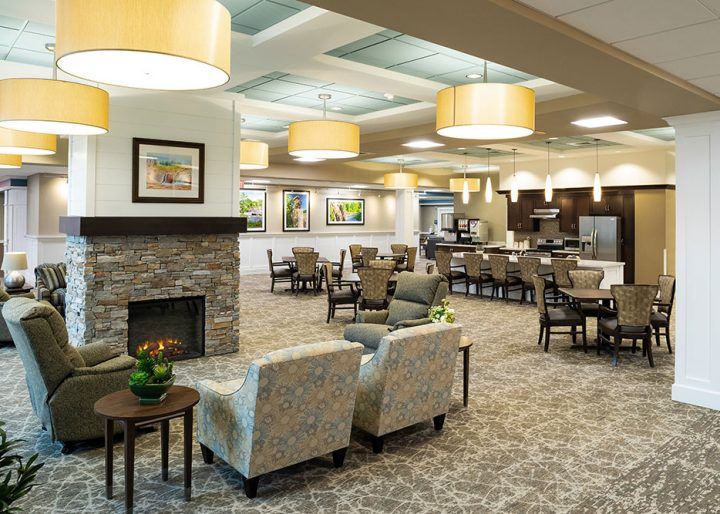Discover the reasons of Assisted Living as a senior care option.
The Role of Assisted Residing In Offering Specialized Treatment for Mental Deterioration Patients
The stipulation of specialized treatment for mental deterioration people within assisted living facilities is increasingly identified as a crucial element of reliable dementia administration. These environments are made to attend to the distinct cognitive and psychological difficulties faced by individuals with mental deterioration, supplying tailored support that advertises safety and wellness.
Understanding Dementia Care Demands
Comprehending the treatment requirements of people with mental deterioration is important for giving efficient support and improving their quality of life. Mental deterioration is a dynamic neurological condition that influences cognitive features such as memory, reasoning, and interaction. Individuals with mental deterioration frequently call for assistance with everyday tasks, personalized care plans, and psychological assistance.
Reliable dementia care includes identifying the unique difficulties encountered by each person. This consists of comprehending the phases of dementia, which can vary from moderate cognitive problems to sophisticated stages calling for detailed help. Treatment requires may incorporate support in managing day-to-day routines, drug adherence, and keeping social communications to avoid isolation.
In addition, sensory excitement and familiar environments can substantially boost the health of people with mental deterioration. Caretakers must be trained to identify behavior adjustments and use strategies customized per individual's choices and previous experiences. Strategies such as recognition therapy and reminiscence can help connect effectively and foster a complacency.
Ultimately, effectively addressing the care requirements of individuals with mental deterioration requires a caring approach, recurring training for caretakers, and a dedication to maintaining self-respect and respect throughout the caregiving process.
Advantages of Assisted Living

Assisted living advertises social communication amongst homeowners, fostering a sense of area and belonging. Engaging with peers can minimize feelings of isolation, which are typical in those living with dementia.
Additionally, numerous assisted living centers offer aid with everyday activities, such as medication administration, bathing, and dish prep work. This assistance permits locals to keep their independence while guaranteeing their health and wellness are prioritized. Eventually, assisted living offers as a useful source, stabilizing care and autonomy for individuals with dementia and their families.

Specialized Programs and Activities
(Memory Care Facilities Charlotte)Recognizing the one-of-a-kind requirements of individuals with dementia, several nursing home implement customized programs and activities developed to improve cognitive function and promote total well-being. These programs often include cognitive stimulation tasks that involve residents in memory video games, problems, and memory treatment, which encourages the sharing of individual stories and previous experiences.
In addition, art and songs therapy play considerable functions in fostering imagination and emotional expression (Memory Care). Engaging locals in paint, crafting, or songs sessions can offer therapeutic advantages, aiding to decrease anxiety and enhance mood. Physical tasks, such as mild exercises and dancing sessions, are also critical, as they advertise flexibility and physical health and wellness while urging social interaction amongst citizens
Organized day-to-day regimens are usually established to give a sense of security and predictability for individuals with dementia. These routines can consist of arranged meal times, group activities, and personalized treatment strategies that accommodate individual interests and capabilities. By creating an improving setting full of tailored activities, assisted living facilities not only boost the lifestyle for mental deterioration patients but also foster a sense of neighborhood and belonging.
Educated Staff and Support
(Dementia Care Charlotte)In helped living facilities, the presence of trained staff is essential for providing efficient support to individuals with mental deterioration. These specialists have specialized expertise and skills to attend to the special needs of homeowners, guaranteeing their safety and security, convenience, and wellness. Personnel obtain training in mental deterioration care, which consists of understanding the development of the illness, acknowledging behavior adjustments, and utilizing reliable communication methods.
In addition, skilled team are outfitted to implement individualized treatment strategies tailored per resident's choices and capabilities. This individualized strategy fosters a feeling of autonomy and self-respect, enabling locals to participate in purposeful tasks that enhance their lifestyle. The staff additionally play a vital function in keeping track of wellness and wellness, promptly determining any changes in problem that might call for medical focus.
In enhancement to guide treatment, qualified staff give emotional support to residents, aiding to alleviate feelings of complication and stress and anxiety that frequently come with dementia. Their compassionate strategy develops a nurturing environment where locals feel valued and comprehended - Assisted Living. Ultimately, the know-how and commitment of qualified staff are indispensable in providing thorough care that satisfies the intricate requirements of individuals living with mental deterioration in assisted living setups
Household Participation and Resources
Family participation plays a significant function in the care of people with mental deterioration in assisted living centers. Involving member of the family in the treatment procedure not only boosts content the psychological well-being of the local however also promotes a joint environment where treatment plans can be tailored to individual needs. Households can offer important insights into the choices, background, and actions of their enjoyed ones, which can notify caregivers and result in more individualized care strategies.
Furthermore, helped living facilities frequently provide sources for households, such as assistance groups and instructional workshops. These resources can assist families recognize mental deterioration, improve communication approaches, and develop coping devices. Involvement in these programs can equip member of the family, outfitting them with the tools essential to support their enjoyed ones successfully.
Additionally, regular communication in between family members and team is important. This recurring dialogue allows households to remain educated about their loved one's development and any type of adjustments in care plans. Eventually, a solid collaboration in between family members and aided living facilities fosters an atmosphere of trust and understanding, guaranteeing that people with mental deterioration obtain the specialized treatment they should have while keeping their household links.
Conclusion
To conclude, helped living facilities play an essential role in attending to the one-of-a-kind requirements of dementia patients via individualized treatment and support. By fostering safe atmospheres, advertising social communication, and carrying out organized routines, these facilities improve the overall health of citizens. The participation of qualified staff and families even more improves the treatment experience, ensuring that specific choices and histories are respected. Inevitably, assisted living gives necessary resources that significantly improve the lifestyle for those coping with mental deterioration.